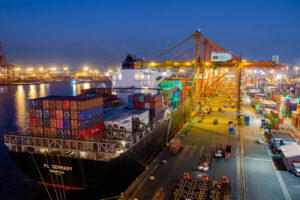




Inflation Update: Green light for easing
 DOWNLOAD
DOWNLOAD

December Economic Update: One for them, one for us
 DOWNLOAD
DOWNLOAD

Philippines Trade Update: Trade trajectories trend along
 DOWNLOAD
DOWNLOAD


DTI mulls lower tariffs on US goods

The Department of Trade and Industry (DTI) said on Monday that it is open to lowering tariffs on US goods in response to US President Donald J. Trump’s imposition of a 17% reciprocal tariff on Philippine goods.
“We are really going to do that… Actually, we, the economic team, are going to meet soon,” Trade Secretary Ma. Cristina A. Roque told reporters on Monday.
She said the Philippines is “definitely” looking at reducing the tariffs on US products but noted that the economic team will discuss the extent of what the Philippines can offer.
Ms. Roque’s statement came after US and Vietnam leaders agreed to discuss a “deal to remove tariffs” after a “very productive phone call” on April 4, Reuters reported.
Ms. Roque said the Philippine government is also looking at a collective response with other Association of Southeast Asian Nations (ASEAN) member-countries to address the higher US tariffs.
Malaysia’s Prime Minister Anwar Ibrahim on Sunday called for a united ASEAN response to the US tariffs. He said Malaysia, as ASEAN chair, is ready to lead efforts to “ensure ASEAN’s collective voice is heard clearly and firmly on the international stage.”
The US slapped ASEAN countries with some of the highest tariffs, which will take effect on April 9. Cambodia is facing a 49% tariff, followed by Laos (48%), Vietnam (46%), Myanmar (45%), Thailand (37%), Indonesia (32%), Malaysia (24%), and Brunei (24%).
Compared with its regional neighbors, the Philippines’ tariffs are among the lowest, only second to Singapore, which was imposed a baseline rate of 10%.
Malacañang on Monday said the government is taking action to reverse the effects of the 17% reciprocal tariff, but declined to give details.
“I am aware that actions will be taken that will be beneficial for our country,” Palace Spokesperson Clarissa A. Castro told a news briefing.
In 2024, the Philippines imported $8.17 billion worth of commodities from the US, and exported $12.14 billion worth of goods to the US, data from the statistics agency showed. This brought the trade surplus to $3.97 billion last year.
The US is a major source of agricultural imports, representing approximately 20% of total Philippine imports.
Earlier, the DTI said it targets to engage the US in a discussion in pursuit of a mutually beneficial trade.
In particular, Ms. Roque said that she plans to facilitate enhanced market access for key US export interests, including automobiles, dairy products, frozen meat, and soybeans, within the framework of a bilateral free trade agreement.
‘Catious’
Meanwhile, Philippine manufacturing firms are likely to be more cautious amid uncertainty arising from Mr. Trump’s tariff policies, an electronics firm executive said.
“Maybe after today, we’ll be more cautious moving forward this second and third quarter… There’s a lot of wait-and-see attitude amongst manufacturing and companies on the impact of the global tariff,” EMS Group Chairman and Chief Executive Officer Ferdinand “Perry” A. Ferrer told BusinessWorld during a phone call on April 3.
EMS Group is a complete electronic, semiconductor and medical subcontracting group that offers technology and manufacturing solutions.
Mr. Ferrer said many local firms, as well as global companies, put expansion plans on hold in anticipation of the tariff announcement.
“The ripple effect is on the supply chain, which affects the Philippines,” he said.
Mr. Ferrer said the relatively lower tariff rate on the Philippines compared with its neighboring countries puts it in a “good position” to secure future investments.
“Moving forward, we can see, we will do some campaigning in our partner countries, from Taiwan, Japan, of course the United States and some European Union countries, on how to bring in the much-needed foreign direct investments (FDIs) in services in manufacturing,” he said.
Earl Lawrence S. Qua, president of the Electronics Industry Association of the Philippines, said the government should try to work with the US to lower the tariffs.
“We need to make sure we do not escalate further and try to negotiate with the US to bring down tariffs. At the moment we need to wait and see how the tariffs will be implemented,” Mr. Qua said.
However, Leonardo A. Lanzona, who teaches economics at the Ateneo de Manila University, said that while the 17% tariff “would seem to be small,” the impact would still be greater compared with other countries since the US is the Philippines’ top export destination.
“To assume that other countries will choose to come in the Philippines because of the lower tariffs is as irrational as these tariffs imposed by Trump,” Mr. Lanzona said.
In 2024, the US was the top destination for Philippine exports, accounting for 17% of the total.
Council
Meanwhile, the Philippine Economic Zone Authority (PEZA) said that it is crucial that the Philippine government establish an Economic Security Council amid the new US tariff measures.
“The proposal to establish an Economic Security Council is crucial given the global business risks posed by US tariffs, as well as the geostrategic considerations that the Philippines must now take into account in these still uncharted waters,” said PEZA Director-General Tereso O. Panga in a Facebook post.
“In PEZA, we believe we must craft a concrete roadmap to move forward together — seizing opportunities while mitigating the impact of tariffs on global trade involving the Philippines,” he added.
The Management Association of the Philippines (MAP) earlier recommended the formation of an Economic Security Council under the Office of the President to address the impact of the US tariffs.
According to the MAP, the council should be composed of the DTI, the Department of Foreign Affairs, the National Security Council, the Department of Finance, the National Economic and Development Authority, PEZA, the Anti-Red Tape Authority, the Department of Labor and Employment, and appropriate private sector and industry representatives.
Mr. Panga said that the first step should be to secure reduced tariff lines for key economic zone (ecozone) exports to the US.
Key ecozone exports to the US include EMS-SMS (electronics manufacturing services and semiconductor manufacturing services), machinery, transport equipment, automotive parts, and select agricultural products, including coconut. — Justine Irish D. Tabile, Reporter with Aubrey Rose A. Insosante and J.V.D.Ordoñez
This article originally appeared on bworldonline.com





 By BusinessWorld
By BusinessWorld